Beach Lit 101: No Slow Parts
The Agony Column for Monday, April 15,
2002
Commentary by Rick Kleffel
We've
hardly left the rainy season behind, but the next summer's Beach Lit
is already crowding the shelves. Yes, there are surely lots of books
that we know to look forward to. There's the new Alastair
Reynolds, 'Redemption Ark', the new Adam
Roberts, 'Stone', and a host of new works from Dan
Simmons.
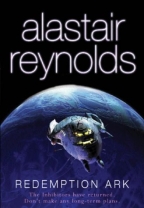
|
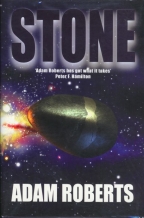
|
|
I'm already plotting the ilnesses that will force me
to lie down and read Alastair Reynolds' sequel to
'Revelation
Space'.
|
How much mystery can the SF genre take and still be
SF? Adam
Roberts offers a protagonist who is also the
perpetrator of planetary extinction in 'Stone'.
|
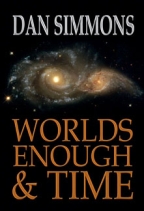
|

|
|
This book arrived yesterday! Thanks to Subterranean
Press, just for being there. Where's the Frequent Buyer
card, folks?
|
I find mysdelf a bit surprised by how much I look
forward to this book. Could it be that it's just guaranteed
top-quality writing?
|
Clive
Barker reportedly has a new 'Book of Blood' coming out in addition to
the long rumored 4-volume Arabat quartet. 'The
Scar', China Mieville's followup to 'Perdido Street Station' is
so close I can practically feel the weight in my hands. (Since I
wrote this line, the email from Amazon.co.uk has arrived letting me
know it's been sent! Not that this will deter the signed version from
various vendors...)

|
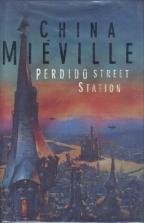
|
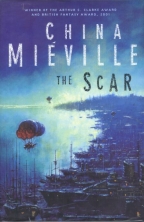
|
|
Well, at least there's a front cover for the long
rumoured Arabat Quartet. At this rate, I'll be buried before
the final volume comes out.
|
China Mieville has been hailed as the next -- er,
never mind. I've been remiss in mentioning this novel, much
of which I read during a stay on a US Aircraft carrier with
my son's Cub Scout Troop.
|
An oceanic theme seems to be in the air. Mieville's
latest is set on the same world as 'Perdido Street Station'
and is winging its way towards me from the UK even as I
write.
|
Ramsey Campbell's newest
supernatural novel is coming from PS Publishing, a publisher that has
a hot list of new stuff in their own right. Look at the small presses
-- they're positively burgeoning. But these are expected! Expected,
planned, on the map! Such are the riches of the discerning reader.
It's almost embarrassing, and would be if all the authors weren't
rock-solid known-for-quality masters. I'm not kidding about the
literature part of the equation here. This isn't guilty
pleasure*
material. The work is not just enjoyable and readable, it's
no-hold-barred analyzable-in-English-class, RE-readable,
shelve-it-and-save-it litrachur. OK, so, none of these guys have
quite made it into the textbook list -- yet. And your high-falutin'
TV book clubs aren't going to feature these writers yet either.
That's a plus.
*(If you factor in the guilty
pleasure material, you'll probably have to give up a significant
portion of your life just to keep up. And you'll probably want some
GP material.
The best thing about reading is that even sticking your nose into a
GP brick is time
better spent than time spent in front of the Great
Satan^H^H^H^H^Hcompetitor, TV and movies. Moreover, you might need to
cut out that pesky cable bill to afford the wealth of new books
coming out. On the flip side, nobody ever sold a video tape recording
of a first run episode of 'Buffy the Vampire Slayer' for $900,
whereas you can sell a first edition Anne Rice novel for that price.
'Buffy' has a lot to recommend it, but not cash back on your time
investment.)
But the expected deluge is as nothing
compared to the UNEXPECTED. That's right, the guy whose first (or
maybe second, third, fourth, or fifth) book just blows you out of the
water without warning. Of course, the new author thing seems like
it's the best experience you can ask for. Remember the first of the
'Books of Blood' by Clive Barker you read? How about Alastair
Reynolds' 'Revelation
Space'? Or the sublime joy of Dan Simmons' 'Song of Kali'? Where
were you when the sky first took on the color of a "television, tuned
to a dead channel"? Sometimes from the very first sighting you know
that you've struck gold, and can put the writer on your auto-buy list
for years to come. What a wonderful feeling!
But other authors you come by gradually, enjoying their books
until the light breaks through the clouds and the heavenly choruses
bring forth their Hallelujahs. Frank Herbert was a great writer
before 'Dune' and something quite different afterwards. Neal
Stephenson stayed under the radar until 'Snow Crash'. Joe R. Lansdale
had to publish more books than he could karate-chop through before he
finally hit 'The Bottoms'. China Mieville's 'King Rat', well written,
nominated for prizes, prepared no-one for his stop at 'Perdido Street
Station'. Following an author from first novel to first masterpiece
is always an enjoyable road.
I've got one of each category for readers of this column today. In
the first category, there's Richard Morgan's 'Altered
Carbon'. Until I heard about it from an online bookseller, I was
in a Sergeant Schultz state -- I knew nothing. I bought it, read it,
and bought three more copies, to salt away for Tough Times. Seems
like we've got a lot of those ahead. Then I suggested friends buy it.
It was that good, and I'd do it again.
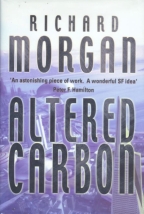
|
|
It's hard to believe that the author shopped this
novel to US and UK publishers and nobody leapt on it.
|
On the face of it, 'Altered Carbon' offers nothing particularly
new. How many cyberpunk noirish mysteries are there out there? More
than I've read, or care to read. One of the Science Fiction plot
points of 'Altered Carbon' is straight out John Varley and Walter
John Williams. The mystery tropes he excavates range from Hammet to
Chandler to Elroy. And none of that matters a lick, because this is a
novel where there are No Slow Parts. Or: You can still paint a nice
picture of a smiling girl even though a Mona Lisa hangs in the
Louvre.
What 'Altered Carbon' offers in spades is Great Writing. You're
hooked from page one until page 404. When you hit 404, you're going
to start asking what else Richard Morgan has written. Alas, the sad
half of the answer is (according to an interview
at Computer Crow's Nest[Watch out for the pop-up!]), not much
that you can find. The glad half is that he's halfway through a
sequel that looks to answer a fair number of the question that any
great SF novel leaves in its trail. In this case, the questions have
to do with the wonderfully suggested "universe" behind the novel.
There are a lot of tantalizing hints about alien civilizations and
the philosophies of the various colonized worlds offered in 'Altered
Carbon', but Morgan wisely sticks to his rocket ship of a story and
his fascinating characters.
That Great Writing referred to above enables Morgan to give us a
grim, vicious violent lead character who walks the line of being
nearly hateful, but whose honorable behavior brings him back from the
brink of unlikable to the edge of interesting. It also enables him to
keep a reader's butt glued to whatever surface is convenient until
the book is finished. He deftly pops between wonderful insights into
human character via 25th century technology and classic mystery
motives and scenes. The Powerful Magnate, the Ambivalent Wife, the
gutsy cop -- they're all there, shreds of the recognizable present
buried in the technologically transformed future. Morgan manages to
get around the problems of a lot of SF novels. One dichotomy that has
always struck me and every other SF reader is the number of novels
which were written in a past not much different than our present,
which portrayed our present as a transformed future. Yet our present
isn't that transformed future. It's the past with a few new bits of
technology crammed in. Morgan grabs that idea and shakes it until a
great story comes out. It's Beach Lit 101, Grade A plus. Out of
nowhere and straight to the top.
Neal Asher definitely hasn't come out of
nowhere. I've already reviewed 'Grindlinked',which
I greatly enjoyed, and now I can officially claim to have Increased
Enjoyment. I've read 'The
Skinner'.
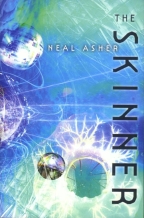
|
|
Those who liked 'Perdido Street Station' should
definitely check out Asher's 'The Skinner'. Complex,
grotesque and imaginative -- never a dull moment!
|
I first encountered Asher in my Tanjen days, advertised in the
back of books by Derek M. Fox. But I didn't pursue 'the master of SF
Horror' simply because I hadn't established my current set of UK
mail-order houses. When 'Grinlinked' popped up last year, I snapped
it up, and then, empowered by book search engines and a lot of great
booksellers, tracked down the rest of his books. It was worth the
trouble. Asher's been working on his universe for a long damn time,
painstakingly building it and reinforcing it with every release.
Now here's one of those weird, Rick Kleffel sort of stories that
crop up from time to time. Here in Santa Cruz, California, there's
another human who comes into possession of the kind of British SF and
horror novels I happen to like. They tend to sell them to the same
store, Logos books, downtown on the Pacific Garden Mall [not the
glassed in monstrosities, but an honest to goodness set of nice shops
and vendors and restaurants lined out in the California fog]. In
the past few years, I've come across first edition hardcover Phil
Rickman novels, first edition trade paperbacks of the recent James
Barclay fantasy series, UK editions of 'Chasm
City', and yes, 'The Engineer' by Neal Asher.
As it happens, 'The Engineer' contains two stories which help set
up 'The Skinner'. 'Snairls' is the tale of Janer, a human who works
for the other intelligence on Earth, the insect Hive Minds of wasps.
Full of subtly distressing imagery, it's the kind of story that only
gets to the edge of your mind, because you really don't want to give
it a full admission ticket. The first story set on the world of 'The
Skinner' (that I've found) is 'Spatterjay', which introduces Erlin
the researcher, Captain Ambel, one of the 'Old Captains' of
Spatterjay, and The Skinner. Both stories were quite good, but
frankly they didn't prepare me for the novel that would follow.
"The Skinner" turns out to be another book with No Slow Parts.
Well, in a way. In that there is never a part where the invention
flags, where the background fails to be painted in vivid colors,
where the characters fail to continue building surprising layers of
interest that endear to the reader what might be otherwise simply,
nasty, horrifying monsters. When parts of the background start taking
on character and taking control of their lives within the novel then
you know you've got something special in 'The Skinner'. It's that
kind of book where the reader can tell that the story took over and
dropped out of the writer. It almost feels channeled. It's also
rather surprising given that Asher doesn't play his card in anything
remotely resembling a "literary" fashion. Furthermore, for a book
filled with violence and one godawful monster after another (some of
them human, some of then alien), it has a rather melacholy, wistful
tone that really works. The settings are vivid and you can
practically smell the salt of Spatterjay's sea. But don't get too
close to the water. Here be monsers.....
Serious
Business

|
|
As usual, just when you thought the deluge of great
science fiction had frankly outstripped reality, that darned
old reality pokes itself back in and demonstrates that it
always has the upper hand. This story
of the plan to build a spaceship powered by atomic bombs is
positively mind-boggling.
|
Readers who browse back in the commentary columns will know that
I'm returning to the column after dealing with some serious business,
so there's a bit of catching up to do. Coming columns will finally
get round to talking about some books I mentioned Way
Back When. John Shirley's latest from Night Shade Books,
'...And the Angel With
Television Eyes' finally made it's way out of the queue.
Apparently, I wasn't hallucinating enough. And in one of those Santa
Cruz moments, I latched onto a non-fiction book which demanded to be
read. It's titled 'Project
Orion: The True Story of the Atomic Spaceship', by George Dyson
(son of physicist Freeman Dyson). It's a mind boggling piece that
almost reads like alternate history. And finally, finally, I got to
the John Courtenay Grimwood books. What a revelation! They are
really, really weird, and perfect fodder for readers of this column.
Fortunately for me, by the time I had started the first, I had
ordered the second.
Thanks,
Rick Kleffel









